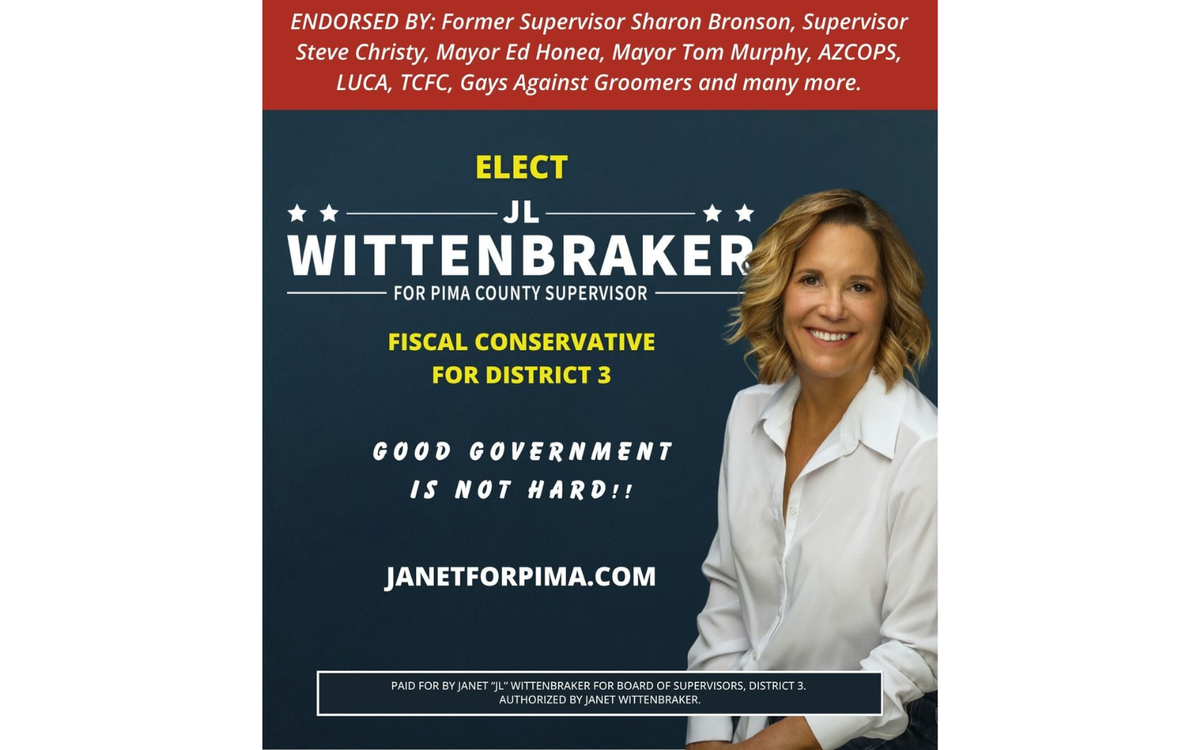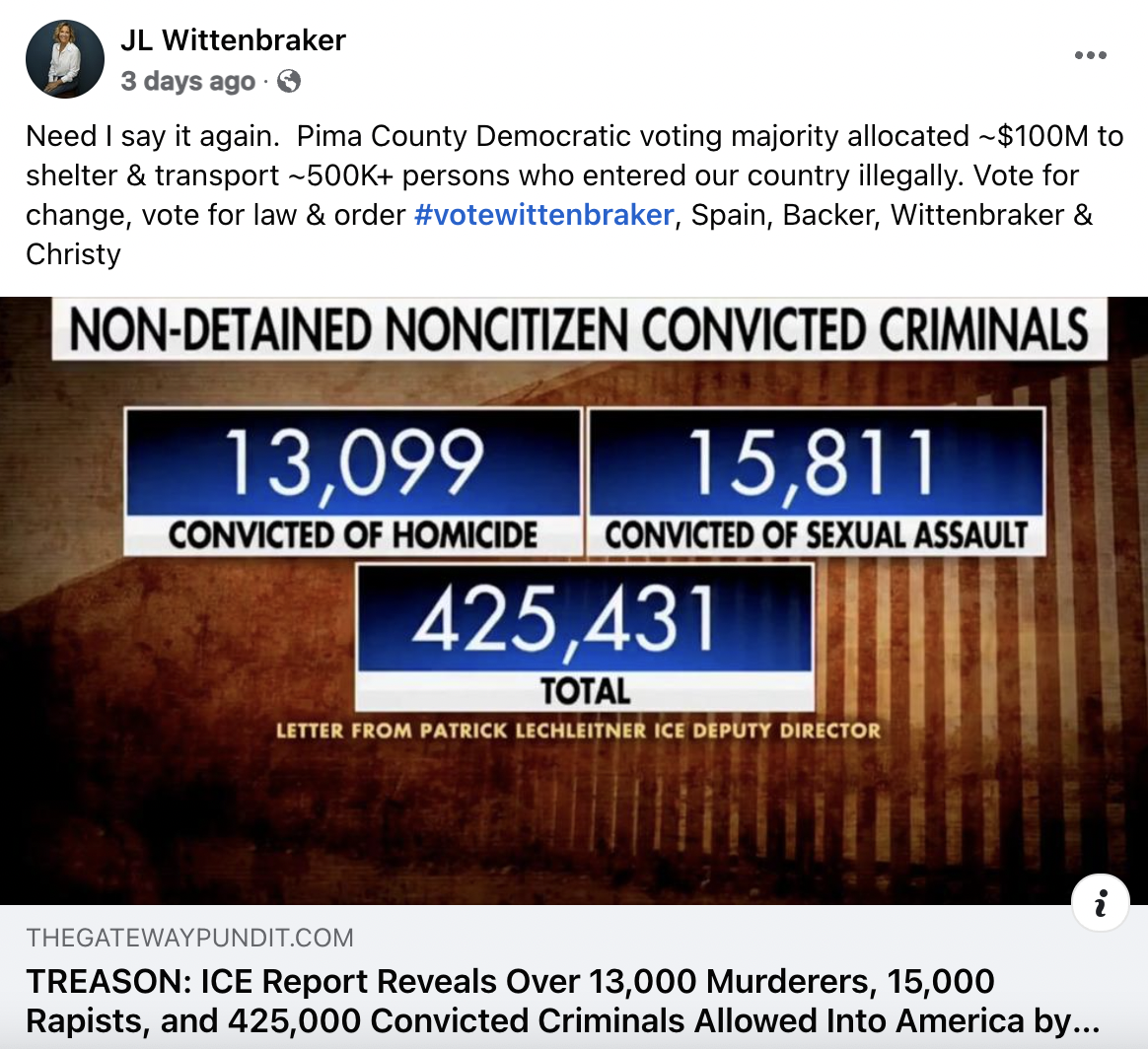Wittenbraker: New strategies needed to fix Pima County's poverty problem
Janet “JL” Wittenbraker describes politics as something she “fell into.” But it’s her experience in city government that she says sets her apart from her opponents in the race for District 3 Pima County Supervisor.

Janet “JL” Wittenbraker describes politics as something she “fell into.”
But it’s her experience in city government that she says sets her apart from her opponents in the race for District 3 Pima County Supervisor.
“Whether it be as a building and code inspector, working in the city manager’s office, or having a law degree – I am very well versed in regulation and what the requirement of government is,” she said.
Wittenbraker will face Democrat Jennifer Allen and Independent Iman-Utopia Layjou Bah in November’s General Election, with ballots set to drop next week.
An Arizona resident for the past 20 years, Wittenbraker entered the political world last year, when she ran for mayor of the City of Tucson. Wittenbraker ran as a Republican, falling short behind current mayor Regina Romero, a Democrat.
And while Wittenbraker says she felt the loss, it wasn’t long before she’d thrown her hat into the ring for supervisor.
“I dusted myself off, and told myself I need to be that role model,” she said.
In the year since her unsuccessful mayoral run, Wittenbraker has been focused on combating the issues she feels are most pervasive in Tucson – the first being poverty, which data shows impacts 19% of Tucson’s population.
“Homelessness is a problem,” she said. “We know the Housing First program, some people refer to it as a low-barrier program. That’s when you provide housing with no expectation of sobriety.”

While she supports the idea, Wittenbraker doesn’t believe people are getting adequate help. She said one guaranteed way to solve the problem is to build more housing.
“There is one city that has tried it and that is San Antonio,” she said. “They coupled that model with also building more housing. Not just housing for low-income persons, but housing across the board.”
In order to replicate this in Tucson, Wittenbraker believes we need to partner with developers, who are burdened by extra building codes that were put on top of the international code council. She knows this, she says, due to her prior job as a building and fire inspector.
“I think we need to reduce regulation,” she said. “For example, a requirement in the city of Tucson is that if you build a new house you need to install an electric vehicle charger.”
While on the surface this may seem like a good idea, and caring for our environment is important, she says, it creates unnecessary regulation – which needs to be reduced in order to build homes so that people can afford to live.
And according to Wittenbraker, poverty goes beyond just those without homes.
“It is a wide range of people,” she said. “There are people of relatively decent incomes for Tucson, who are living paycheck to paycheck. There are people who are living on the streets,” she said.
She proposed a combination of solutions to this issue, saying she doesn’t believe that poverty can be fixed by throwing money at it or by giving out handouts. Instead, her faith is in building more homes and facilitating a more competitive market to nourish further economic opportunity for citizens.
“The problem with Tucson is that we have very few businesses,” she said. “So therefore, they’re not competing for employees, which keeps the wages low.”
On top of poverty, Wittenbraker cites other issues within District 3, one being unauthorized immigrants entering the properties of Lukeville and Three Points residents.
“People who are coming into the country illegally, I’m talking about the get-aways,” she said. “People who are coming through carrying drugs, sex-trafficking – all of that is a big problem for them.”
While it’s being handled on a state and federal level, she says, people should still do everything they can to assist the federal government with the situation.
If elected, Wittenbraker says improving roads and creating more of them are another top priority. She believes we need to evaluate what work has been done through the Regional Transportation Authority and its tax dollars.
“We need to look at what they’re doing and decide if the county wants to support another round of increased taxes,” she said.
The current RTA plan is set to expire in June 2026, with government officials from the City of Tucson, Pima County and other jurisdictions working to develop a new plan to address transportation projects and programs.
But beyond just transportation funding, Wittenbraker believes Pima County’s spending is out of control.
“Pima county is running at a $1.4 billion deficit,” she said. “They did, in fact, receive federal funds, but those funds are gone.”
The county has increased property tax three times, in over three years, she said. With property values going up, so do citizens’ property taxes. Getting the budget under control will require some tough decisions, Wittenbraker said.
“You have to elect people into office who are willing to make those tough decisions,” she said. “If Pima County goes broke, we all go broke.”
Olivia Krupp is a journalism major at the University of Arizona and Tucson Spotlight intern. Contact her at oliviakrupp@arizona.edu.



